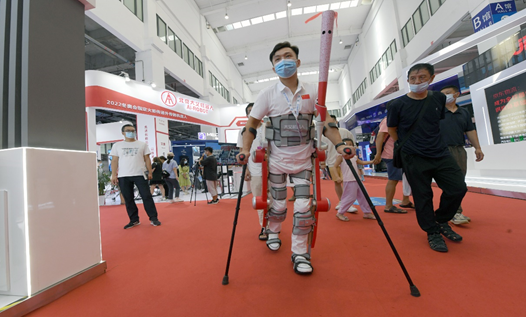By OUYANG SHIJIA | CHINA DAILY

A staff member shows how to use a wearable exoskeleton robot, developed by Beijing AI-Robotics Technology Co, in a torch relay scenario at the World Robot Conference 2022 in Beijing on Aug 18. [PHOTO by FU DING/FOR CHINA DAILY]
In robotics, China takes rapid strides to evolve to next higher level, spurs emerging business
In some sophisticated hotels in digital-era China these days, within minutes of seeking room service via in-house phone system or the hotel app, guests hear a funny yet very courteous electronic voice and a firm knock-knock on their room door. Upon opening the door, they will likely see a gleaming, android-like advanced service robot, which must have reached the room using the elevator independently.
Such futuristic scenes abound at other sites too. For instance, at exhibition venues, robots greet visitors and guide them through exhibits.
At manufacturing plants, robots work 24 hours a day to produce and assemble industrial products according to the procedures set by engineers.
In fact, such robots contributed to the early and effective resumption of work and production after the disruptions of the COVID-19 outbreaks in 2020 and this year as well.
What is enabling China's rapid strides in robotics is its accelerated integration of artificial intelligence, 5G, new materials and other emerging technologies, experts said.
In China, robotics has been applied in an ever-increasing number of fields, spawning new industries and new businesses. This trend has greatly impacted the way production is done. Besides, people's daily lives have improved, showing that robotics is a strong driver of economic and social development, they said.
"In recent years, robots have increasingly become an indispensable part of smart factories as well as key equipment to achieve intelligent manufacturing," said Tao Yong, an associate research fellow at Beihang University in Beijing.